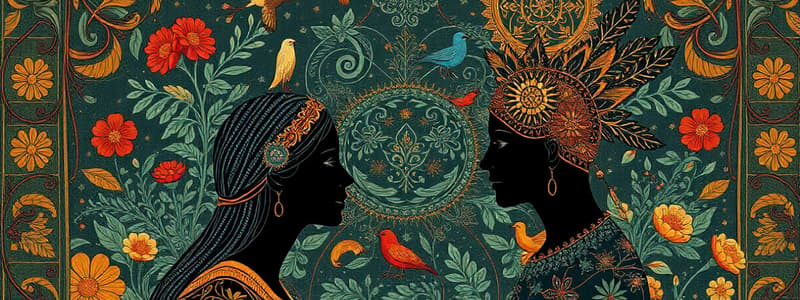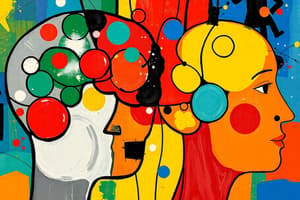Podcast
Questions and Answers
Operant conditioning means that reinforcement follows desired behavior.
Operant conditioning means that reinforcement follows desired behavior.
False (B)
Ethnography involves immersing oneself in a community to study behaviors from a distance.
Ethnography involves immersing oneself in a community to study behaviors from a distance.
False (B)
Culturally constructed issues, such as gender, are created and shaped by cultural influences.
Culturally constructed issues, such as gender, are created and shaped by cultural influences.
True (A)
Reflexivity refers to the unchanged viewpoint of the researcher in a study.
Reflexivity refers to the unchanged viewpoint of the researcher in a study.
A case study is an observational method used to study a subject over a short period.
A case study is an observational method used to study a subject over a short period.
Correlation studies look for relationships between two or more variables.
Correlation studies look for relationships between two or more variables.
Content analysis involves evaluating the language used in historical documents to search for bias.
Content analysis involves evaluating the language used in historical documents to search for bias.
Unstructured observation relies on having a strict hypothesis before studying a subject.
Unstructured observation relies on having a strict hypothesis before studying a subject.
The Out of Africa theory suggests that humans first evolved in Asia.
The Out of Africa theory suggests that humans first evolved in Asia.
Charles Darwin's work primarily involved the study of hominid fossils and their significance.
Charles Darwin's work primarily involved the study of hominid fossils and their significance.
Rites of passage in various cultures often include ceremonies to mark significant changes in life status.
Rites of passage in various cultures often include ceremonies to mark significant changes in life status.
Asch's studies indicated that people would only conform to a group's opinion if they agreed with it.
Asch's studies indicated that people would only conform to a group's opinion if they agreed with it.
Matrilineal societies recognize only the father's side of the family.
Matrilineal societies recognize only the father's side of the family.
The concept of kinship refers to relationships formed by blood, adoption, or other bonds.
The concept of kinship refers to relationships formed by blood, adoption, or other bonds.
Louis and Mary Leakey significantly contributed to the discovery of the australopithecus africanus skull.
Louis and Mary Leakey significantly contributed to the discovery of the australopithecus africanus skull.
Lineage allows individuals to trace their descent from a common ancestor.
Lineage allows individuals to trace their descent from a common ancestor.
Cultural anthropology includes the study of skeletal remains.
Cultural anthropology includes the study of skeletal remains.
August Comte is known for coining the term sociology.
August Comte is known for coining the term sociology.
Karl Marx believed that capitalism would eventually lead to a classless society.
Karl Marx believed that capitalism would eventually lead to a classless society.
Primatology is the study of human physical differences.
Primatology is the study of human physical differences.
Sigmund Freud developed the psychoanalytic theory, emphasizing the divided mind.
Sigmund Freud developed the psychoanalytic theory, emphasizing the divided mind.
B.F. Skinner's experiments involved using positive and negative reinforcement to shape behavior.
B.F. Skinner's experiments involved using positive and negative reinforcement to shape behavior.
Linguistic anthropology studies the physical remains of human ancestors.
Linguistic anthropology studies the physical remains of human ancestors.
Emile Durkheim believed that society functions logically to protect the interests of its members.
Emile Durkheim believed that society functions logically to protect the interests of its members.
Flashcards
Out of Africa Theory
Out of Africa Theory
The theory that modern humans first evolved in Africa and spread to other parts of the world.
Evolution
Evolution
A process by which different kinds of living organisms are thought to have developed and diversified from earlier forms.
Fossil
Fossil
The remains of a prehistoric organism, especially a human, found in the earth.
Rites of Passage
Rites of Passage
Signup and view all the flashcards
Religion
Religion
Signup and view all the flashcards
Patrilineal
Patrilineal
Signup and view all the flashcards
Matrilineal
Matrilineal
Signup and view all the flashcards
Bilineal
Bilineal
Signup and view all the flashcards
Linguistic Anthropology
Linguistic Anthropology
Signup and view all the flashcards
Archaeology
Archaeology
Signup and view all the flashcards
Paleoanthropology
Paleoanthropology
Signup and view all the flashcards
Primatology
Primatology
Signup and view all the flashcards
Human Variation
Human Variation
Signup and view all the flashcards
Emile Durkheim's Theory
Emile Durkheim's Theory
Signup and view all the flashcards
Max Weber's Theory
Max Weber's Theory
Signup and view all the flashcards
Alfred Adler's Individual Psychology
Alfred Adler's Individual Psychology
Signup and view all the flashcards
Operant Conditioning
Operant Conditioning
Signup and view all the flashcards
Ethnography
Ethnography
Signup and view all the flashcards
Ethnocentrism
Ethnocentrism
Signup and view all the flashcards
Reflexivity
Reflexivity
Signup and view all the flashcards
Subculture
Subculture
Signup and view all the flashcards
Case Study
Case Study
Signup and view all the flashcards
Correlation Study
Correlation Study
Signup and view all the flashcards
Historical Analysis
Historical Analysis
Signup and view all the flashcards
Study Notes
Social Science Terms/Concepts
- Social science - the attempt to study people, their activity, behavior, and customs
- Humanities - Study aspects of human society and culture
- Anthropology - the study of human lives and cultures, both living and dead
- Psychology - the study of behavior and mental processes
- Sociology - the study of human social life, groups, and societies
- Positivism - the idea that scientific evidence is the most reliable resource for understanding society
- Class conflict - struggles between different social classes
- Conscious mind - memories that can be recalled
- Unconscious mind - memories that cannot be recalled (a powerful tool to study the human mind)
- Free association - a method where patients speak whatever comes to mind, typically used in relaxation or hypnosis, can reveal hidden thoughts in the unconscious mind
- Id - pleasure principle, seeks to satisfy desires without considering rules, present at birth
- Ego - reality principle, judges right from wrong and emerges in early life, acts as the mediator between the id and superego
- Superego - moral center of the mind, represents society's values and norms
- Archetypes - universal symbols or patterns present in the collective unconscious of all humans (Carl Jung)
- Individual psychology - focus on individual personal goals and values
- Analytical psychology - Founded by Carl Jung, focusing on the unique personal unconscious and the collective unconscious, shared by all
- Unconditional stimulus - a stimulus that automatically triggers a response (e.g., smell of food = feeling of hunger)
- Conditioned stimulus - a stimulus that, through association with an unconditioned stimulus, eventually triggers a conditioned response (e.g., a bell associated with food eventually triggers salivation)
- Unconditioned response - automatic reaction to an unconditioned stimulus (e.g., salivating to the smell of food)
- Conditioned response - automatic response to a conditioned stimulus (e.g., salivating to the bell after association)
- Hierarchy of Needs - basic needs must be met before higher needs (Maslow's theory)
- Classical Conditioning - describes the relationship between stimulus and response and show that responses can be learned and conditioned, humans act in ways they know will reward them
- Operant Conditioning - learning through consequences, behavior is encouraged or discouraged based on reinforcement
- Ethnography - method of observing a community or organization to understand behavior
- Ethnocentrism - Belief that one's own culture is superior to others' cultures
- Culturally constructed - elements of culture, such as gender, shaped by the culture
- Reflexivity - awareness of one's own biases and perspectives
- Subculture - small groups within a larger group sharing common values, lifestyles and attitudes
Research Methods
- Case studies - Observation over time, used in all social sciences
- Experiments - Determines relations between several factors, often used in sociology
- Surveys - Obtain information from large groups of people, used in sociology
- Interviews - Detailed conversations to gather information, used in all social sciences
- Unstructured observation - Studying without a prior hypothesis, used in sociology and anthropology
- Structured observation - Planning beforehand what to look for, used in all social sciences
- Participant observation - Observing participants in a culture or society for an extended duration, often used in sociology
- Correlation study - Examining relationships between variables, used in sociology
- Historical analysis - Studying historical events and documents to understand the past
- Content analysis - Examining texts and documents to identify themes and patterns
Studying That Suits You
Use AI to generate personalized quizzes and flashcards to suit your learning preferences.




